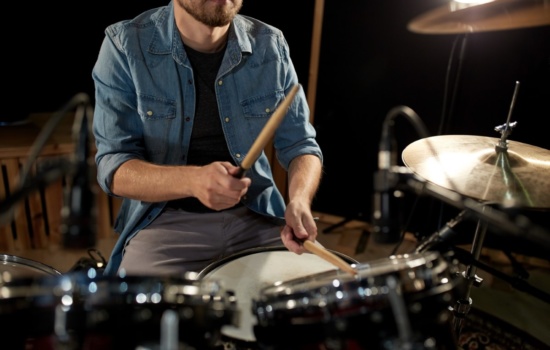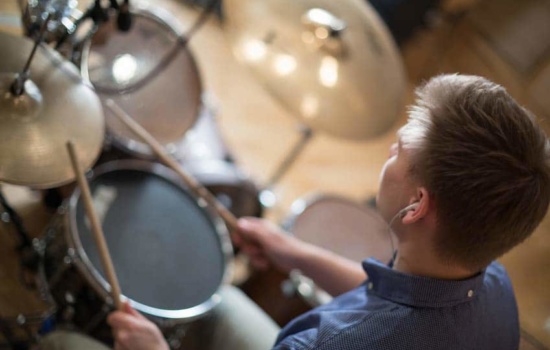Music Career Finder
Start Here:
Percussionist

How To Become a Percussionist
- A percussionist plays multiple different percussive instruments, like the drums, tambourine, marimba, cymbal
- Percussionists need to know how to play every type of percussion instrument, which includes dozens of instruments
- Percussionists usually work evenings and weekends when performances happen
- On top of being a performing percussionist, your career can involve recording session work and teaching percussion
- The average income for a performing percussionist is $52,924 per year but can range from about $24,000 to $112,000 per year
- Career Description
- Salary
- Career Outlook
- Career Path
- Experience & Skills
- Education & Training
- References
Career Description
A percussionist is a musician who plays multiple different percussive instruments, which is any instrument that can be struck, shaken, or scraped.
This includes drums, tambourines, marimbas, cymbals, and many others (full list below).
What Does a Percussionist Do?
Percussionists perform in various musical genres, from classical to jazz to rock to world music. They provide the rhythm and often add melodic elements to a piece of music.
Here are the main things a percussionist does:
- Practice regularly
- Compose or arrange music for percussion parts
- Rehearse with other musicians
- Perform in concerts, bands, or orchestras
- Teach percussion to students
- Maintain instruments
- Record music in recording studios for albums or soundtracks
- Explore different genres of music and percussion techniques
A Day In the Life of a Percussionist
Your day will look different depending on the current gig you have, but most percussionists find work in an orchestra or ensemble.
So here are the typical things a percussionist does on a given day:
- Learning new music
- Setting up and tuning percussionist instruments
- Practicing and arranging their parts
- Going to rehearsals
- Performing
- Tearing down and storing equipment
Salary
The average income for a performing percussionist is $52,924 per year, but it can range from about $24,000 to $112,0002.
Percussionist Jeremy Bender, citing the American Federation of Musicians’ wage charts, said you can earn $1,000-3,000 per week, depending on the size of the orchestra3.
Here are some numbers he showed as examples:
- The Buffalo Philharmonic: $1,188 per week
- The Columbus Symphony: $1,585 per week (works for 27 weeks of the year, an annual salary of $42,795)
- The San Diego Symphony: $1,667 per week (works for 42 weeks of the year, an annual salary of $72,141)
- The Los Angeles Philharmonic: $3,048 per week
Percussionists can also work as session musicians, recording parts for soundtracks and albums. In these cases, they’re paid hourly or per project and negotiate their own rates.
On top of this, you can also teach percussion once you become proficient enough. You set your own rates, but typically they can be $20-60 an hour.
Hey, what do you think about trying our new Music Career HelperMusic Career Helper really quick? It’s totally free and could help get your career moving fast! Give it a try. It’s totally free and you have nothing to lose.
Career Outlook
The career outlook for percussionists is promising, with diverse opportunities available across various musical realms. Orchestras and ensembles need a rhythm section, so percussionists are in demand.
They usually find employment in symphony orchestras. But the increasing fusion of musical genres has opened doors for percussionists in jazz, world music, and contemporary pop too.
Because of this, percussionists usually work in the evenings and on weekends when performances typically happen.
They also have plenty of opportunities to be session musicians, recording percussion on soundtracks and artists’ albums.
And then there’s always the option to teach percussion, whether privately or in a school setting.
You may want to combine these various aspects into a career tailor-made for the lifestyle you want and your personality.
Career Path
There’s not one way to become a career percussionist, but here are some ways to get started…
Performing Percussionist
Performing percussionists usually work for an orchestra or ensemble. You’ll most likely need a music degree or some sort of formal education as that is something the orchestra will look at to qualify or disqualify you as a potential hire.
Session Musician
Session work is when you go into a recording studio to play percussion on a track, whether for a soundtrack or an artist’s song. You can get into this line of work without any degree. As long as you’re a great percussionist, know how to read sheet music, and meet the right people, you can get gigs as a session percussionist.
Percussion Teacher
You won’t need a music degree to teach percussion, but it can definitely help you get students if you’re teaching privately. If you give lessons at a school or music shop, they most likely will want to see that you had a formal music education.
Experience & Skills
You have to know “the full range of orchestral percussion instruments…to an extremely high standard,” according to renowned percussionist Sacha Johnson.
What Instruments Does a Percussionist Play?
The instruments you need to know how to play as a percussionist include:
- Snare drum
- Timpani
- Marimba
- Tambourine
- Triangle
- Cymbals
- Bass drum
- Congos
- Bongos
- Xylophone
- Drum kit
- Maracas
- Cowbell
- And many more…
“The range of percussion instruments is so huge that it is almost impossible to be proficient on all of them,” Johnson said. “In the last 12 months, I’ve had to play the Bodhran (Irish folk drum), the spoons, and the steel drums.”
Here are some of the main skills you’ll need as a percussionist…
Rhythm
You can’t get past this one. You need to have rhythm if you want to be a percussionist. If your rhythm is not good, taking percussion lessons can greatly help.
Hand-Eye Coordination
Mastery of hand-eye coordination is essential. Percussionists often navigate complex patterns and rhythms across various surfaces and materials.
The skilled percussionist is not only adept at producing precise and dynamic sounds but also possesses a keen sense of timing and dynamics, crucial for maintaining the rhythm of a musical piece.
Versatility
As you can tell from the list of instruments above, you can see that percussionists must excel in versatility, seamlessly transitioning between different percussion instruments and styles of play.
Reading Sheet Music
You must be able to read sheet music and understand how to follow a conductor’s direction. Whether you’re performing on stage or recording in a studio, you will need to follow music notation.
Education & Training
Here are the ways you can get the education you need to become a career percussionist…
Take Percussion Lessons
Percussionists typically begin their musical journey at a young age, sometimes initiating their training with private lessons. These early experiences focus on developing fundamental playing techniques and hand-eye coordination.
Regardless of age or experience, lessons can help you improve much faster than learning on your own.
Percussionist Degree
If you want to pursue a professional career as a percussionist, higher education is a good pathway to take. Attending a conservatory, college, or university with a music program offers comprehensive training, covering music theory, history, and practical skills specific to percussion.
The degree you should get is a Bachelor of Music in Performance with an emphasis on percussion. Through this degree, you’ll also learn how to read music, the basics of music theory, and how to perform to the best of your ability.
Music Camps and Competitions
Many percussionists get extra education and enrichment through summer programs, music camps, and percussion competitions. These endeavors help refine their skills and expose them to a broader musical landscape.
References
- 1. " Martin Grubinger presents the upbeat world of percussion instruments | Musica Maestra ". DW Classical Music. published: Dec 8, 2019. retrieved on: Oct 30, 2024
- 2. "What is a percussionist and how to become one". Zippia. published: June 25, 2024. retrieved on: Oct 30, 2024
- 3Jeremy Bender. "Pro percussionist's pay". Drummerworld.com. published: March 7, 2022. retrieved on: Oct 30, 2024





